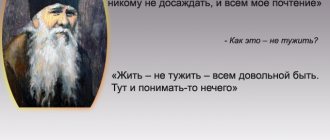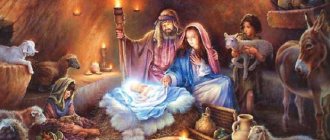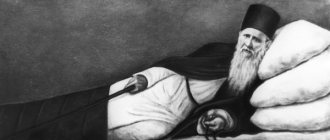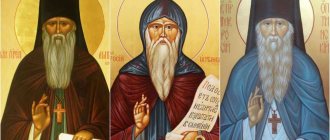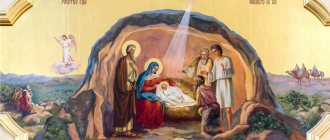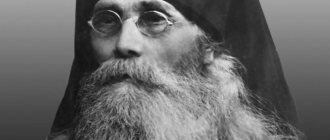Correspondence with lay persons
Your letter, dear Father Konstantin, was received by me yesterday. Thank you very much for the letter, for the holy memory of us sinners, Father Ambrose, and for everything I thank you sincerely, but in a hurry. – The departure and arrival of many acquaintances in Moscow and all sorts of troubles do not leave any free time. I hear a lot of sad and menacing, daring and crazy things, and very, very often I remember your monastery and all its inhabitants.
From what I heard, here is a wonderful, but for me incomprehensible dream of Dimitri Matveevich (Tver priest). He saw a vast cave dimly lit by one lamp; there are many clergy in the cave; behind the lamp is the image of the Virgin Mary; in front of the image in vestments, Metropolitan Philaret and the late Matvey Alexandrovich3. Everyone prays silently and in fear. At the entrance to the cave, Dimitry Matveevich and I: we are both trembling and do not dare to enter. Among the silent prayers, the following words can be heard clearly: “We are going through a terrible time. We are in our seventh summer." - With these words, awakening in great excitement and fear. The dream is repeated up to three times, still the same, without the slightest change, clear and terrible. Neither Dimitry Matveevich, who had the dream, nor I understand anything at all. Not even where the dream came from. Dimitri Matveevich asked me not to tell anyone, especially the Metropolitan, about this.
N.B. You write that the late Matvey Alexandrovich sometimes spoke and judged the Metropolitan quite harshly. His son remembered that the metropolitan’s sermons were subject to quite severe criticism. If there was time, I would also like to inform you about some magazine articles and others, about the district message of the Bishop of Orleans, Dupanloup, about the Masonic catechism. If not today, then another time I will send some of this. What I have to say about myself, I think you have already been told NN. In any case, we cannot wait for your advice; It seems that I cannot refuse a trip to St. Petersburg, and it seems that I will go, although with effort or violence against myself. The trip is very unpleasant both morally and physically - and, I admit, the main burden is material. Besides, uniforms, apparitions, trivial questions and answers. For this, farewell; From the above, you see how necessary for me the prayers of Father Ambrose5 and everyone who do not forget about me, a sinner and weak. I ask with all my heart, together with my wife. She was quite seriously ill the other day and worried us, but, thank God, she has now recovered. The latest day of my departure is in a week.
Your sincerely humble humble servant, Count A. Tolstoy.
Moscow, Wednesday, October 12, 1866."
Explanation of the dream by Elder Ambrose
One pious priest of the Tver diocese saw in a dream a vast cave, dimly lit by one lamp; there are many clergy in the cave; behind the lamp was the image of the Mother of God, in front of the image stood the Archpastor of Moscow (who is still alive) and the late Archpriest of Rzhev, Father Matvey, the parent of the said priest, who was distinguished in his life by special piety. Everyone stands in silence and fear. At the entrance to the cave there is the priest himself and one lay person - the spiritual son of the late archpriest; both of them are trembling and do not dare to enter. Among the silent prayers, the following words are clearly heard: “We are going through a terrible time, we are living through the seventh summer.” With these words I woke up in great excitement and fear. The dream is repeated up to three times, still the same, without the slightest change, clear and terrible.
Neither the priest who saw this, nor the spiritual son of Father Matvey, both understand absolutely nothing, neither what the dream means, nor even where it comes from.
It is inconvenient to deal with such things. However, so as not to leave you without an answer, let’s say a little about how we think about this, based on the testimony of the Divine and Patristic Scriptures.
There were examples that some, trusting all sorts of dreams, fell into the seduction of the enemy and were damaged. Therefore, many of the saints forbid trusting dreams. Saint John Climacus in the 3rd degree says: “He who believes in dreams is unskilled in everything, but he who does not believe in any dream can be considered wise.” However, this same saint makes a distinction between dreams and says which ones can be believed and which ones should not be believed. “Demons,” he writes, “are repeatedly transformed into angels of light and into the image of martyrs and represent to us in a dream as if we were coming to them; and when we awaken, they fill us with joy and exaltation. Let this be a sign of delight for you, for angels show us in dreams torment, the Last Judgment and condemnation, and fill those who awaken with fear and lamentation. When we begin to believe demons in our sleep, they will curse at those who are watching us. Just believe the dreams that foreshadow to you about torment and Judgment; and if they lead you to despair, then know that these too are from demons” (Degree 3, section 28).
And the closest student of Simeon the New Theologian, the humble Nikita Stifat, writes even more clearly and definitely about dreams. In the 2nd centenary, in chapters 60 - 63, he says: “Some dreams are simple dreams, others are visions, others are revelations. The characteristic of simple dreams is that they do not remain unchanged in the reverie of the mind, but have a confused reverie and often change from one subject to another; From which dreams there is no benefit, and that very dream perishes when excited by sleep, which is why the careful should despise it.
The sign of vision is that, firstly, they are unchangeable and do not transform from one to another, but remain imprinted in the mind for many years and are not forgotten. Secondly, they show an event or outcome of future things, and from emotion and terrible visions they are guilty of spiritual benefit, and the viewer, due to the terrible unchanging vision of the visible, is led into trembling and lamentation; and therefore visions of such visions should be considered to be a great thing by those who are careful.
Simple dreams happen to ordinary people, subject to gluttony and other passions; due to the darkness of their minds, they imagine and act out various dreams from demons. Vision comes to people who are thorough and purify their spiritual feelings, which through what is visible in a dream are beneficial to the comprehension of Divine things and to greater spiritual ascent. Revelations come to people who are perfect and acted by the Divine Spirit, who through long and extreme abstinence and deeds and labors according to God have reached the level of prophets of the Church of God, as the Lord says through Moses: “If there be a prophet in you... I will be known to him in a vision, and I will speak to him in a dream.” »
(Num. 12:6).
And through the prophet Joel: “And it shall come to pass after this, that I will pour out My Spirit on all flesh, and your sons and your daughters will prophesy, and your old men will see dreams, and your young men will see visions”
(Joel 2:28) (Philokalia ", part 4)".
Based on the words of the humble Nikita, the said dream vision can be classified as a vision. A vast cave, dimly illuminated by one lamp, may signify the present situation of our Church, in which the light of faith barely shines; and the darkness of unbelief, daringly blasphemous freethinking and new paganism, surpassing ancient paganism in its deeds, spreads everywhere, penetrates everywhere. This truth is confirmed by the words heard: “We are going through a terrible time.” The living saint and the deceased archpriest, praying together in vestments before the icon of the Mother of God, make it clear that the other clergy seen were twofold. Apparently, worthy shepherds, alive and gone to the Lord, looking at the disastrous state of our Church, beg the Queen of Heaven, may She spread Her supreme protection over our distressed Church and may she protect and preserve the weak, but who have a good will for salvation. Both standing at the entrance to the cave, who trembled with fear and did not dare to enter, perhaps mean people with lively participation and with sorrow and even fear looking at the sad events of the present time in relation to faith and morality, but not resorting to the Queen of Heaven and not praying to Her for protection and help, like those praying in the cave.
The words “we are living through the seventh summer” may mean the last time, close to the time of the Antichrist, when the faithful children of the One Holy Church will have to take refuge in caves, and only the all-powerful prayers of the Mother of God can then shelter them from the persecution of the servants of the Antichrist. The apostolic words are especially appropriate for the present time: “Children, this is the last hour. And just as we have heard that the Antichrist is coming, and now there are many Antichrists, from this we understand that this is the last hour.”
(1 John 2:18).
At present, some are already voluntarily accepting the seal of the Antichrist on the forehead and on the right hand, because for the sake of secular decency and worldly benefits they are ashamed to protect themselves with the sign of the cross; and at first they do this in society and for the sake of pleasing people, and then, out of custom, they do not make the sign of the cross and at home before eating food and drink and in other cases, which brings great joy to their spiritual enemies, for whom they, being not protected by the power of the cross and prayer , become a playground and a laughing stock.
The seventh number in the church number is great. The term of church time is listed in seven-day weeks. The Orthodox Church is contained and guided by the rules of the seven Ecumenical Councils. Seven Sacraments and seven gifts of the Holy Spirit in our Church. The revelation of God was revealed to the seven Asian churches. The Book of God's destinies, seen in Revelation by John the Theologian, is sealed with seven seals. Seven vials of the wrath of God poured out on the wicked, and so on. All this septennial calculation refers to the present age and must end with the end of it. The future century in the Church is signified by the eighth number. The sixth psalm has the following inscription: “A psalm to David, at the end, in songs about the osmine”
, - according to the interpretation, about the final day, that is, about the universal day of the Resurrection and the coming Last Judgment of God, which, fearing, the Prophet prays to God, with tenderness of heart, for the forgiveness of sins:
“Lord, do not reprove me with Your wrath, punish me with Your wrath.” me”,
etc. (Ps. 6:2).
– The Week of Antipascha, or St. Thomas, in the Colored Triodion is called the week of the eighth, that is, the eternal and endless day, which will no longer be interrupted by the darkness of nights. “There will be no night there
,” that is, in the Heavenly Jerusalem, says Revelation (Rev. 22:5). - Blessed is he who is worthy to enjoy the bliss of this blessed and endless day, may we all receive through the goodness and mercy and love of mankind of the Only Begotten Son of God, our Lord Jesus Christ, to whom befits glory and power, honor and worship, with His beginningless Father and the Most Holy Good and the Life-giving Spirit, now and ever and unto ages of ages. Amen.
Let us repeat again the words of the humble Nikita that visions in dreams are sent for spiritual benefit, and therefore the careful should value them. In addition to what has been said, another immediate benefit from the said vision may be the following. It is known that there was some misunderstanding between the late archpriest and the still living archpastor. The former expressed himself quite harshly about the latter in some cases in front of his children and loved ones. But confusion and misunderstandings occur only between the living; death reveals the truth as it is. Perhaps, through the prayers of the late father Matthew, the all-good and wise Providence of God, who always arranges what is beneficial for His servants, showed in the said vision both praying together, in order to destroy for one an opinion that is unfavorable and unhelpful for some, and to completely free the other from guilt, if only which was from untimely jealousy. The Lord alone knows the secret intentions and secret reasons why a person acts in one way or another; people look only at the face or at external actions, without comprehending the secret intentions of the heart.
Misunderstandings also happen between saints. Saint Cyril of Alexandria, due to incorrect rumors, had an unfavorable opinion about Saint John Chrysostom both during his life and even after his death; but the Queen of Heaven, through a special vision, destroyed this misunderstanding and reconciled them. And between Serapion, Archbishop of Novgorod, and Joseph, Abbot of Volokolamsk, there was for a considerable time not only a misunderstanding, but even fate itself. The gentle and trusting Serapion, through the intervention of some people, put the wise and far-sighted Joseph on trial and summoned him to Moscow to the Supreme Court, but Serapion remained guilty. Shortly before their death, the misunderstanding was abolished and holy peace was established between the saints. Now the relics of both testify to their righteousness and holiness.
Let’s not be too lazy to write about the third spiritual benefit. The humble Nikita says that the meticulous can benefit from the simplest dreams, learning through them the dispositions and actions of his soul and body. Having recognized his internal inclinations and ailments, he can, if he wants, use appropriate medicine for them. One who is prone to the love of money sees in a dream gold, which he multiplies with interest or hides in a secret place, or is judged as unmerciful, or tortured by others. One subject to voluptuousness and intemperance sees in a dream either various foods or tempting objects. A person suffering from anger and envy in dreams imagines that he is being persecuted by animals, or poisonous reptiles, or in general is subject to some kind of insurance and fear. If someone loves vain glory, then he dreams of praise and solemn meetings from people, thrones of authority and power. Filled with pride and arrogance, he dreams in his sleep that he rides around in magnificent chariots and sometimes seems to fly through the air on wings, or that everyone is in awe of his great glory. On the contrary, a God-loving person, being thorough in doing virtuous acts and righteous in deeds of piety (that is, not deviating either into immensity or impoverishment) and being pure in soul from partiality and attachment to the material and sensual, sees in dreams the outcome of future things and the revelation terrible things and, waking up from sleep, finds himself praying with tenderness of soul and body, so that he finds tears on his cheeks, and a conversation with God on his lips.
The All-Good Lord, by His ineffable love for mankind, will enlighten us all and guide us to everything that is useful, soul-bearing, and saving.
Letters from the Optina elders
In the very center of Russia, in the Kaluga region, on the banks of the small cozy river Zhizdra, the famous Optina Monastery is located - the Holy Vvedensky Monastery. However, the monastery is hidden from prying eyes in a particularly secluded way, and inexperienced pilgrims can get lost in the ring of roads near Kozelsk for a long time before they find the only correct one.
Optina Pustyn has its own unique history and its own treasures. The main spiritual treasure was eldership - a special and remarkable phenomenon that has always attracted believers of all ages and classes. For many decades, the monastery was inhabited by wise elders who had the gift of providence and conviction and bestowed their attention on those who turned to them with requests and advice. This was called spiritual nourishment.
In the forest, not far from the monastery, there is a monastery where the elders lived and received visitors. To enter the skete meant to receive special mercy, since the reverend fathers were constantly in prayer. By the way, in the prayer books you can read the poetic prayer of the Optina elders, which has special conviction and energy:
“Lord, let me meet with peace of mind everything that the coming day will bring me. Let me completely surrender to Your holy will. For every hour of this day, instruct and support me in everything. Whatever news I receive during the day, teach me to accept it with a calm soul and a firm conviction that everything is Your holy will.
In all my words and deeds, guide my thoughts and feelings. In all unforeseen cases, do not let me forget that everything was sent down by You.
Teach me to act directly and wisely with each member of my family, without confusing or upsetting anyone.
Lord, give me strength to endure the fatigue of the coming day and all the events during the day. Guide my will and teach me to pray, believe, hope, endure, forgive and love. Amen".
The spiritual heritage of the Optina elders is not limited to this prayer. The Holy Fathers conducted quite an extensive correspondence with their “spiritual children.” In 2003, the Sretensky Monastery publishing house published the book “Letters of the Optina Elders,” which instantly found its reader.
In the monastery of Optina Monastery, a special epistolary tradition has developed, combining the traditional genre of spiritual messages and the genre of private letters of modern times, with the psychological, historical and everyday specificity inherent in the latter. These letters are not outdated today, since they introduce us to the world of active spiritual “doing,” which is based on the entire experience of the Church.
Addressing a specific addressee, the elders, as a rule, gave advice that was useful to many who had similar problems. Therefore, letters from Optina consistently affirmed the spiritual, moral and ethical foundations of life. The conversation could be about family life, about protecting the Fatherland, about raising children, about the inadmissibility of idle talk and much more.
The above-mentioned book contains letters from four great elders: hieroschemamonks Leo (Nagolkin), Makariy (Ivanov), Ambrose and Anatoly (Zertsalov), who lived in the 19th century. However, the compilers also recall other names - Schema-Archimandrite Barsanuphius (Plekhankov), Hieroschemamonk Joseph (Litovkin) and the last, great elder Nektary (Tikhonov), who died in 1926.
The Monk Ambrose of Optina, who carried on extensive correspondence with the laity, became especially famous. Vl. Lossky in his book “The Elders of Optina Hermitage” says: “The correspondence of Elder Ambrose was immense. Every day he received from thirty to forty letters. They were laid out in front of him on the floor and he used his staff to point out those that required an immediate response. Often he knew the contents of a letter even before opening it.”
In one of his letters, Elder Ambrose wrote: “The conquering mercy of God, which bears no sin, wants to be saved in everything and to come to the true mind. Therefore, put aside your unreasonable despair and try to keep the commandments of God; and whatever you sin, repent and correct yourself. Endure all the sorrows that befall you according to the word of God: in your patience gain your souls, and he who endures to the end will be saved. Do not hold anger against your family, but pray for them and for all those who hate and offend you; By the grace of God you will be saved if you do these things, that is, the commandments of God.”
Ambrose Optinsky also left another short and charming saying, memorable like a short poem:
How to live? Don’t bother living, don’t judge anyone, don’t annoy anyone, love everyone, and my respect to everyone!
This commandment, understandable even to children, is heard in the film St. Govorukhin “Bless the Woman”, giving an extremely simple and at the same time wise life instruction not only to fictional characters, but to all of us reflecting on the meaning of life.
Many great writers resorted to Optina wisdom and holiness - Nikolai Gogol, Fyodor Dostoevsky, Leo Tolstoy, Anna Akhmatova... And each of them found in the monastery answers to their complex, philosophical, sometimes unsolvable questions in worldly life.
Letters from the Optina elders will continue to be in demand. They are already being studied in philological departments of universities, in the course of the history of Russian literature, Orthodox psychology and pedagogy. “Read these letters,” wrote the Monk Ambrose of Optina about the letters of Elder Macarius. “I have no doubt that in them you will find abundant edification and consolation in your sorrows and a solution to the perplexities that you encounter.”
